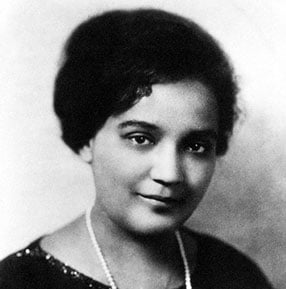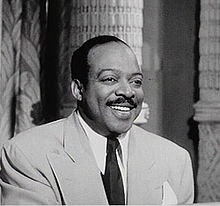African American Contributions to the History of New Jersey
This guide features information and resources about several notable African Americans historical figures. For more in-depth research, please see the research guides for Africana Studies or New Jersey Primary Sources.
Paul Robeson
Paul Robeson and William Still are two of among the hundreds of notable figures in New Jersey's African-American history. See related page on this guide for information on the Still family.
Paul Robeson - Was born on April 9, 1898, in Princeton, New Jersey. At school, Robeson did well in academics, music, singing, and sports. In 1915 Robeson won a four-year scholarship to Rutgers College. He was only the third African-American to attend the school.
Robeson worked hard and succeeded at everything he tried at Rutgers. He was a star athlete in football, basketball, baseball, and track. In speaking competitions, he won first place. He also did well in all his classes and graduated as class valedictorian.
After graduating from college, Robeson went to law school while playing professional football. While in law school he fell in love with Eslanda "Essie" Goode, and they married in 1921. After receiving his law degree, Robeson joined a law firm, but quit after a white secretary refused to work with him.
Robeson loved singing and acting, so he decided to become a performer. The first play he starred in was "All God's Chillun Got Wings." People protested the play and made bomb threats because a white actress played the role of his wife. But the people didn't scare Robeson, and he continued to act.
Audiences loved Robeson's performances, and he became a role model for other African-Americans. Success allowed him to inform people about African-American history and culture. He turned down roles that stereotyped African-Americans. In 1925, Robeson decided to perform at a concert, singing black spirituals. The show was an instant success and led to albums and a tour.
Robeson performed in many different plays in England and in the United States. His most famous role was in the musical "Showboat." He performed the show in England, on Broadway in New York City, and in a movie version. "Ol' Man River," a song from the musical, became his signature song. He is also famous for his role in the William Shakespeare play "Othello." He was the first black actor to play Othello in almost 50 years. Even though the character is African-American, white actors had traditionally played the part with black face make up. Robeson liked the part because it was a good role for an African-American actor.
Although Robeson was very talented and famous, his popularity did not last. He always spoke out against discrimination, and, in the 1940s, his ideas for fixing this social problem and other problems were unpopular. Because it was more important to Robeson to stand up for his beliefs than to be well liked, he became unpopular, too. By 1950, many people in America did not want to see him act or sing.
During the next twenty years, Robeson sang in a few concerts and acted as well, but he spent most of his time with friends and family. In 1973 he turned 75 years old. Finally, people recognized the contribution made by this gifted and dedicated man. Rutgers University honored him, and his son organized a "Salute to Robeson" event at Carnegie Hall in New York City. Robeson died in 1976 at the age of 77. Today Robeson is remembered as a talented performer whose ideas were ahead of his time.
Larry Doby
Larry Doby (1923-2003). Doby was the first African American to play in the American League, this occurring just eleven weeks after Jackie Robinson, of the Brooklyn Dodgers in the National League, became the first black in modern major league baseball. Doby was also the second African American to manage a major league baseball team-the Chicago White in 1978. Born in Camden, South Carolina, he moved to Paterson in his youth and became an all-state athlete in football, baseball, and basketball at Paterson Eastside High School.
Thomas Mundy Peterson
Thomas Mundy Peterson (October 6, 1824 – February 4, 1904) of Perth Amboy, New Jersey was the first African-American to vote in an election under the just-enacted provisions of the 15th Amendment to the United States Constitution. His vote was cast on March 31, 1870
Notable Names & Black Firsts
Jacob Lawrence (1917-2000). Born in Atlantic City. One of the foremost painters in twentieth-century America; he was the first black artist to be represented by a major commercial gallery and the first to receive mainstream recognition. His best known series was the "Migration of the Negro," produced in 1940.
 Jessie Redmon Fauset (1882-1961) was a major contributor to African American literature. A talented writer of essays, reviews, and fiction, she was a vital force in the Harlem Renaissance. In 1919 she became the literary editor of Crisis, the official organ of the NAACP. She was born in Fredericksville, a hamlet in Camden County.
Jessie Redmon Fauset (1882-1961) was a major contributor to African American literature. A talented writer of essays, reviews, and fiction, she was a vital force in the Harlem Renaissance. In 1919 she became the literary editor of Crisis, the official organ of the NAACP. She was born in Fredericksville, a hamlet in Camden County.
 Florence Spearing Randolph (1866-1951). A member of the clergy and a social activist, Randolph was among the earliest African American women licensed to preach and serve as a pastor of a church. Her most distinguished pastorate, lasting twenty-one years, occurred at Wallace Chapel African Methodist Episcopal Zion Church in Summit. She was the founder in 1915 of the New Jersey State Federation of Colored Women's Clubs, the state's oldest black women's organization. Born and raised in Charleston, South Carolina, she moved to Jersey City in 1885.
Florence Spearing Randolph (1866-1951). A member of the clergy and a social activist, Randolph was among the earliest African American women licensed to preach and serve as a pastor of a church. Her most distinguished pastorate, lasting twenty-one years, occurred at Wallace Chapel African Methodist Episcopal Zion Church in Summit. She was the founder in 1915 of the New Jersey State Federation of Colored Women's Clubs, the state's oldest black women's organization. Born and raised in Charleston, South Carolina, she moved to Jersey City in 1885.
(Courtesy of the Official Web Site for the State of New Jersey)
Count Basie

William James "Count" Basie (August 21, 1904 – April 26, 1984)[1] was an American jazz pianist, organist, bandleader, and composer born and raised in Red Bank, NJ. He played vaudeville before eventually forming his own big band and helping to define the era of swing with hits like "One O'Clock Jump" and "Blue Skies." In 1958, Basie became the first African-American male recipient of a Grammy Award. One of jazz music's all-time greats, he won many other Grammys throughout his career and worked with a plethora of artists, including Joe Williams and Ella Fitzgerald.
Early in his career Basie played the vaudevillian circuit and eventually became stuck in Kansas City in the mid-1920's. He eventually met band leader Walter Page and was introduced to big band jazz, and later went on to work with Benny Motten. Basie formed his own band after Motten's death in 1935. He called his band the Barons of Rhythm. He got his nickname during a radio broadcast of the band's performance when the announcer wanted to give Basie's name some pizazz. Keeping in mind the existence of other bandleaders like Duke Ellington and Earl Hines, he called the pianist "Count".
The band became reknown for its soloists, rhythm section and style of swing. Basie himself was noted for his understated yet captivating style of piano playing and precise, impeccable musical leadership. He lead one of the biggest, most famous African-American jazz groups of the day.
